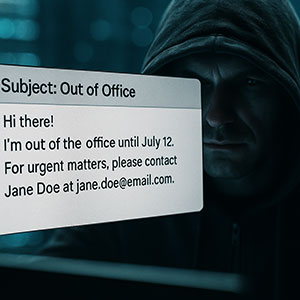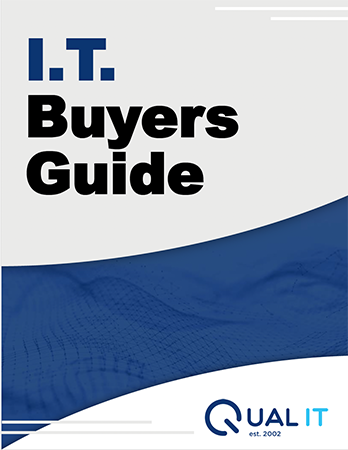 When it’s time for a break, most professionals set a quick Out-of-Office (OOO) reply, pack their bags, and disconnect. But if you run or manage a medical practice in Salt Lake City, that simple auto-reply could be handing cybercriminals exactly what they need to compromise your network.
When it’s time for a break, most professionals set a quick Out-of-Office (OOO) reply, pack their bags, and disconnect. But if you run or manage a medical practice in Salt Lake City, that simple auto-reply could be handing cybercriminals exactly what they need to compromise your network.
As a healthcare provider, your systems hold protected health information (PHI)—making you an ideal target for cyberattacks. And sadly, hackers know your out-of-office reply might just open the door.
Why Out-of-Office Emails Are a Cybersecurity Risk for Salt Lake Medical Clinics
A typical auto-reply might look like this:
“Hi there! I’m out of the office until [date]. For urgent matters, please contact [coworker’s name and email].”
It’s helpful to patients and vendors—but to hackers, it's a treasure trove.
Here’s what attackers learn:
- Who’s out (and when)
- Internal staff structure
- Alternate contacts with emails
- Possible travel details
- Titles and roles (like Office Manager or Billing Coordinator)
For cybercriminals targeting healthcare IT in Salt Lake City, this is prime information for launching phishing attacks or Business Email Compromise (BEC).
What a Hacker Might Do with Your OOO Reply
- Your auto-reply is triggered.
- A spoofed email is sent to your alternate contact, pretending to be you.
- The email requests sensitive patient data, EMR login info, or a wire transfer.
- The coworker, in a rush or unaware, complies.
By the time you return from your trip to St. George or Yellowstone, your clinic may have suffered a HIPAA violation, data breach, or financial loss.
Why Medical Practices Are Especially Vulnerable During Vacation Season
In Salt Lake City’s healthcare community, summer often means:
- Smaller in-office teams
- Remote access to EMRs and EHRs
- Overworked admin staff fielding urgent messages
Combine that with an unverified email, and you’ve got a perfect recipe for disaster.
5 Ways to Protect Your Salt Lake City Practice from OOO Exploits
If your clinic uses managed IT services or cloud-based EMR systems, here’s how to protect yourself—even while out of office:
- Keep Auto-Replies Vague
Never share travel details, alternate contacts, or internal job titles.
Better template:
“I’m currently out of the office and will respond upon my return. For immediate assistance, please contact our main office at [general contact info].”
- Train Your Staff on Email-Based Threats
Cybersecurity in healthcare starts with people.
- Don’t act on email-only requests involving credentials, PHI, or money.
- Always verify unexpected requests by phone or secure messaging.
- Invest in HIPAA-Compliant Email Security
Your Salt Lake clinic should have:
- Anti-phishing filters
- Anti-spoofing tools like SPF, DKIM, and DMARC
- Domain monitoring services
A great healthcare-focused MSP can help you configure these.
- Enforce Multifactor Authentication (MFA)
Even if credentials are stolen, MFA helps stop unauthorized access.
Apply MFA to:
- Email accounts
- Remote EMR logins
- Cloud-based practice management tools
- Partner with a Proactive Medical IT Provider in Salt Lake
You need an IT support team who understands HIPAA, EHR systems, and local medical compliance—and who watches your systems 24/7, even when you’re out hiking the Wasatch.
Want to Vacation Without Becoming a Hacker’s Next Target?
At [Your Company Name], we help Salt Lake City medical practices lock down their systems and safeguard patient data—no matter who’s out of the office.
👉 Book your FREE Security Assessment today.
We’ll review your vulnerabilities, assess your compliance posture, and give you a clear plan to keep your clinic secure—even when your inbox is on vacation mode.



